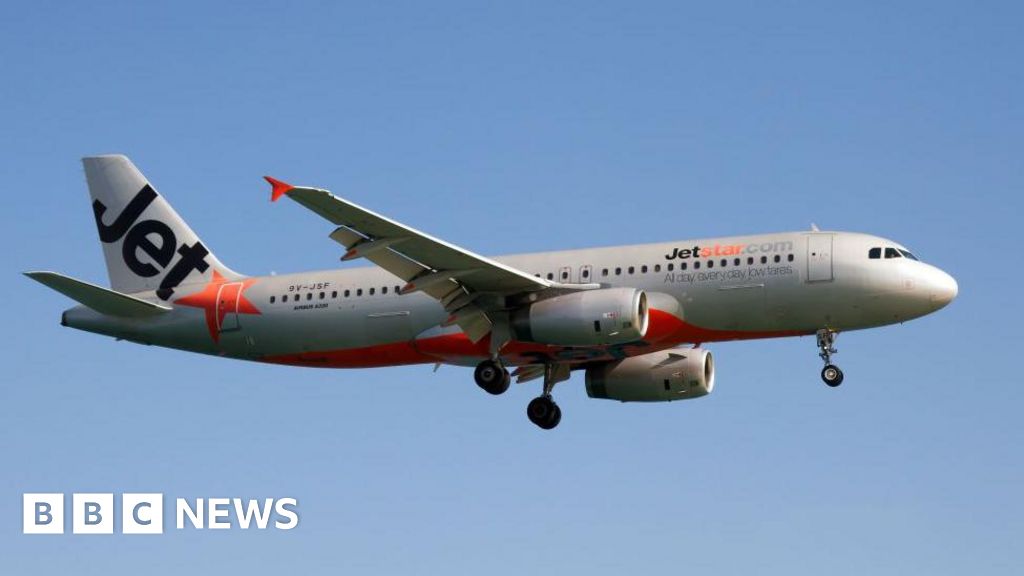Singapore-based budget airline Jetstar Asia will close down at the end of July, its Australian owner Qantas has announced. The low-cost carrier has struggled with rising supplier costs, high airport fees and increased competition from other airlines in the region. Qantas says the closure will provide it with A$500m ($325.9m; £241.4m) to invest towards renewing its fleet of aircraft, adding that it will redeploy 13 planes for routes across Australia and New Zealand. The closure of Jetstar Asia will not impact its Australia-based Jetstar Airways operations, nor those of Jetstar Japan, according to a statement from Qantas. "We have seen some of Jetstar Asia's supplier costs increase by up to 200 per cent, which has materially changed its cost base," said Qantas Group Chief Executive Vanessa Hudson in the statement. The discount airline, which has operated flights for over 20 years, is set to make a A$35m loss this financial year.
Australia's Qantas to close budget airline Jetstar Asia
TruthLens AI Suggested Headline:
"Qantas Announces Closure of Budget Airline Jetstar Asia Amid Financial Struggles"
TruthLens AI Summary
Qantas, Australia's flagship airline, has announced the closure of its Singapore-based budget airline, Jetstar Asia, effective at the end of July. This decision comes as Jetstar Asia has faced significant financial challenges, including rising supplier costs, increased airport fees, and fierce competition from other airlines operating in the region. Qantas has indicated that the closure will allow it to allocate approximately A$500 million (around $325.9 million or £241.4 million) towards renewing its fleet of aircraft. In addition, the airline plans to redeploy 13 of Jetstar Asia's aircraft to expand routes across Australia and New Zealand. Importantly, Qantas has assured that this closure will not affect its other operations, specifically those of Jetstar Airways in Australia and Jetstar Japan, as confirmed in a recent statement from the company.
In the statement, Qantas Group Chief Executive Vanessa Hudson highlighted the drastic increase in supplier costs, which have surged by up to 200 percent, significantly altering Jetstar Asia's cost structure. The budget airline, which has been in operation for over two decades, is projected to incur a loss of A$35 million in the current financial year. This closure reflects Qantas's strategic response to the evolving aviation market and its commitment to maintaining a competitive edge while managing operational costs. The decision underscores the challenges faced by low-cost carriers in the current economic climate, where fluctuating costs and competitive pressures have become increasingly pronounced. As Qantas moves forward, it aims to strengthen its core operations while investing in more sustainable and efficient aircraft for its future endeavors.
TruthLens AI Analysis
The announcement regarding the closure of Jetstar Asia by Qantas reveals a multifaceted narrative about the airline industry’s challenges and the strategic decisions of major players. This development is significant not only for the airline itself but also for the broader market dynamics and economic landscape in the region.
Economic Implications
Qantas is reallocating resources following the closure, which is projected to save A$500 million. This financial maneuver allows for investment in fleet renewal, indicating a focus on modernizing operations. The decision also highlights the rising costs of operations in the airline industry, particularly in Asia, where Jetstar Asia has faced a dramatic increase in supplier costs, reportedly up to 200%. Such challenges reflect broader trends in the aviation sector, where budget airlines are increasingly squeezed by operational costs and competitive pressures.
Public Perception and Messaging
The communication from Qantas emphasizes that the closure will not affect its other branches, aiming to reassure stakeholders and customers. By framing the closure as a strategic decision to strengthen the overall business, Qantas seeks to mitigate any negative public perception. The company’s leadership under Vanessa Hudson projects a proactive approach, potentially influencing public sentiment positively despite the unfortunate news about Jetstar Asia.
Transparency and Hidden Narratives
While the news appears straightforward, it may obscure deeper issues within the airline industry, such as the ongoing impacts of the pandemic, changing travel patterns, and the competitive landscape. The loss of A$35 million reported for the current financial year raises questions about the sustainability of low-cost carriers in the region. This situation may lead to speculation about other airlines facing similar challenges, hinting at a broader crisis in the budget travel segment.
Connections to Broader Trends
When compared to other news in the aviation sector, this story aligns with a trend of consolidation and restructuring among airlines globally. The ongoing economic pressures and competitive dynamics may suggest a future where only the most resilient budget airlines survive.
Market Reactions
This news could influence stock prices and investor confidence, particularly for Qantas and other airlines operating in the Asia-Pacific region. The airline sector is sensitive to changes in operational efficiency and market competition, making Qantas’ strategic realignment potentially impactful for its stock performance.
Social and Political Context
The decision to close Jetstar Asia may resonate differently across various communities, particularly those reliant on budget travel options. This could lead to increased scrutiny from consumer advocacy groups and political stakeholders concerned about the availability of affordable travel options in the region.
Considering the analysis, the article seems to be reliable. It presents factual information regarding the closure, the financial implications, and the company's strategic direction. However, the language used may lean towards a corporate narrative that aims to project stability and reassurance amid a challenging environment.
